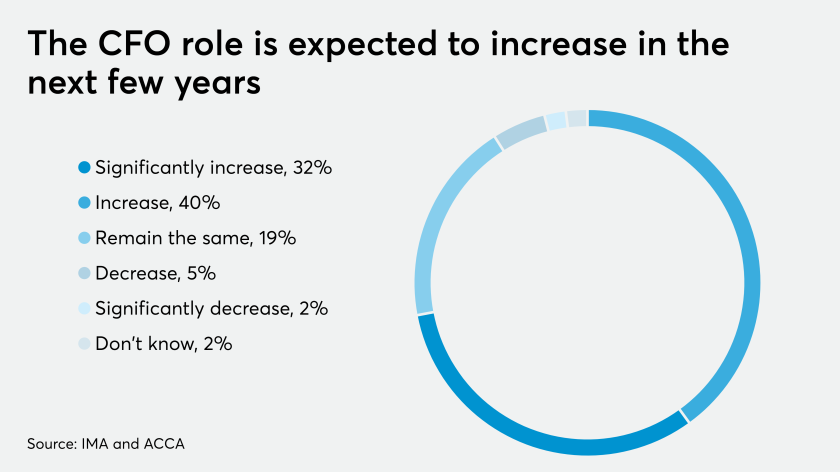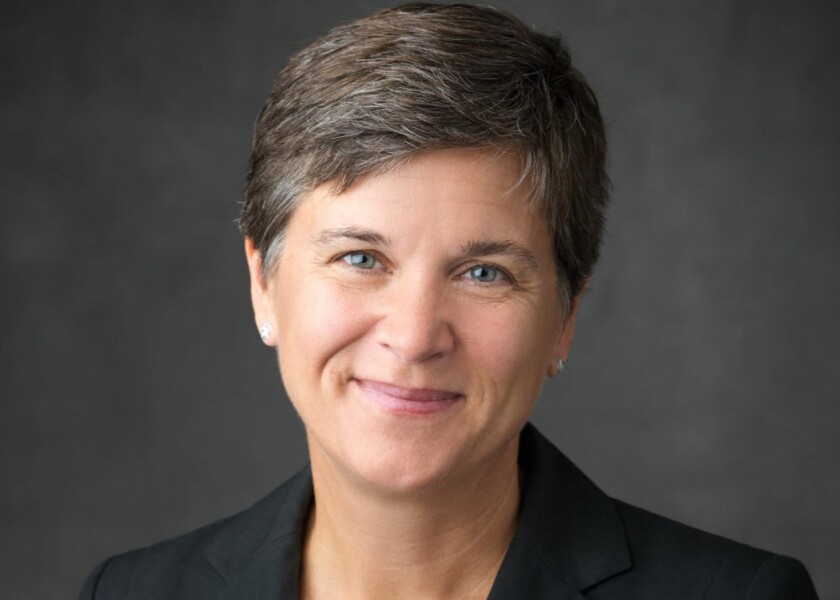CFOs are assuming a greater role at their organizations in the midst of the COVID-19 pandemic and are likely to hold onto those greater responsibilities once the pandemic subsides, according to a new report from the Institute of Management Accountants and the Association of Chartered Certified Accountants.
For the report, the IMA and ACCA surveyed 1,152 of their members and found that 72 percent of the respondents believe the role of the CFO will either “increase or increase significantly” in importance. Seventy-eight percent of the respondents indicated that the ethical lens was a differentiating factor for the CFO in comparison to other executives. Meanwhile, 82 percent of the CEO respondents surveyed feel the role of CFO would increase or significantly increase in importance, and 68 percent of CEO respondents say that people highly value the strategic insights of CFOs.
Kimberlee Cornett is the director of impact investments at the Robert Wood Johnson Foundation.
Byron Storms has served as president and CEO of Aspire General Insurance Services and Aspire General Insurance Company since August 2015. Prior to joining Aspire General Insurance, he was the president of property & casualty at National General Management Corp from 2012 to 2015. From 2007 to 2012, Storms was president and CEO of ClearSide General Insurance Services, LLC, which was acquired in November 2011 by National General. Storms has a proven track record of assembling strong teams, integrating and implementing technology solutions that create core operational strength, and supporting effective growth.
“This is in a sense a followup study to a joint study we did with the ACCA eight years ago and we had made predictions back then about how the role of the CFO would change,” said IMA vice president of research and policy Raef Lawson. “It was extremely rewarding to see that our predictions were right on. We had predicted that the role of the CFO would be transitioning from financial reporting and stewardship to more of the strategic business partnership role, more engaged through external stakeholders. That’s all taken place. The interesting thing is that the pandemic seems to have just accelerated this change.”

It’s no longer enough for CFOs to simply oversee the finances at the companies where they work. More and more, they’re playing an essential role in the management and governance of their organization. “That entails not only an immediate focus on cash management and cash flow, which are incredibly important during the pandemic, but having a broader engagement in the operations of their organizations and being more involved in the strategy formulation of their organization,” said Lawson. “What we envisioned about the CFO eight years ago is really now essential for organizations. CFOs have a unique perspective of their organizations. They see all the moving parts and help their organizations adjust their strategy and implementation of that strategy, almost on a real-time basis.”
The IMA and ACCA see various ways in which the future role of the CFO seems to be evolving. The CFO may become more focused on stakeholder and investor management rather than safeguarding and reporting. The CFO will likely have a leading responsibility for business strategy formulation, validation, and execution. The focus of the role seems to be shifting from mostly historic-based cost control to growth optimization. The role is likely to encompass measurement of all aspects of the strategic objectives of the organizations. The CFO will provide the greatest value to the organization through forward insight rather than retrospective reporting. According to some respondents, CFOs are increasingly expected to eventually take on the CEO role as the next progression in their career development.
The urgency of the pandemic and the recession it caused have accelerated that increasing role for the CFO, forcing a reexamination of the company’s strategy, risks and business model. It has also forced technological changes such as the need for remote work arrangements.
“Technology is something that we have emphasized a lot at IMA in terms of changing the role of finance in general and the CFO, but this has accelerated the technological transformation of finance,” said Lawson. “We’re all working from home now, or many of us are, learning new technological skills that we probably wouldn't have done otherwise. Not just in terms of working from home skills and communication, but moving to the cloud has become accelerated. We’re all learning new ways to improve our processes to be more efficient, This transformation has been accelerated by the pandemic. The old saying is may you live in interesting times, and COVID has certainly made these times very interesting for CFOs. It’s made the role more challenging, but also made it more essential to the survival and prosperity of their organizations.”
The survey didn’t ask about specific technologies, but it did ask about what priorities were on the CFO’s agenda, and transformative technology was cited as one of the biggest challenges for CFOs. “I think their technological plans probably went out the window or had to be accelerated by the coronavirus,” said Lawson. “It necessitated the introduction of new technologies like Zoom or Microsoft Teams. For many companies, it’s been an adjustment, but those that made the adjustment have seen how more effective and efficient their finance functions are. I think that many businesses won’t go back to business as usual.”
Technical skills are considered to be important, with 54 percent of the survey respondents saying that an accountancy qualification or master’s degree is essential, with 27 percent considering it to be strongly recommended but not essential. Only 2 percent believe neither is needed.
The economy seems to be recovering since the start of the pandemic, but the continuing spread of COVID-19 across the U.S. and other parts of the world leaves many business leaders uncertain about the future.
“The economy is recovering, but it’s going to take time and it looks like there will be bumps in the road in this economic recovery,” said Lawson.
The outcome of the November election is another uncertain factor weighing on the minds of CFOs. “I don’t want to get into politics, but I think the different major parties have different economic agendas and different approaches to handling the pandemic and stopping its spread, so I think the election could have a major impact on the recovery,” said Lawson.
More and more CFOs are getting involved in supply chain issues after experiencing shortages at the start of the pandemic. “One of the interesting results from our current study is that CEOs seem to place more emphasis on the supply chain, which perhaps is due to their broader perspective, but regardless of that, the supply chain is a critical issue as we’ve come to see with the supply chain disruptions brought about by the pandemic,” said Lawson. “CFOs can no longer ignore that part of the business and the risks that supply chain disruptions can bring.”



